沪教版牛津英语【初三下册】Unit 1 Great explorations知识讲解
最新沪教牛津版九年级下册课文与翻译汇编
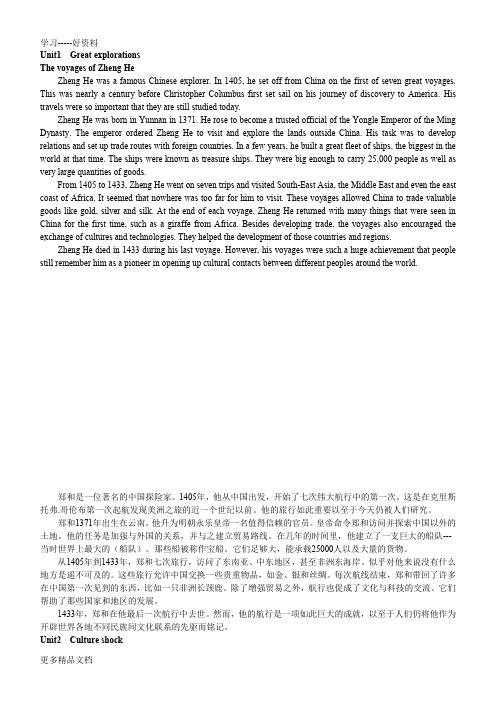
Unit1 Great explorationsThe voyages of Zheng HeZheng He was a famous Chinese explorer. In 1405, he set off from China on the first of seven great voyages. This was nearly a century before Christopher Columbus first set sail on his journey of discovery to America. His travels were so important that they are still studied today.Zheng He was born in Yunnan in 1371. He rose to become a trusted official of the Yongle Emperor of the Ming Dynasty. The emperor ordered Zheng He to visit and explore the lands outside China. His task was to develop relations and set up trade routes with foreign countries. In a few years, he built a great fleet of ships, the biggest in the world at that time. The ships were known as treasure ships. They were big enough to carry 25,000 people as well as very large quantities of goods.From 1405 to 1433, Zheng He went on seven trips and visited South-East Asia, the Middle East and even the east coast of Africa. It seemed that nowhere was too far for him to visit. These voyages allowed China to trade valuable goods like gold, silver and silk. At the end of each voyage, Zheng He returned with many things that were seen in China for the first time, such as a giraffe from Africa. Besides developing trade, the voyages also encouraged the exchange of cultures and technologies. They helped the development of those countries and regions.Zheng He died in 1433 during his last voyage. However, his voyages were such a huge achievement that people still remember him as a pioneer in opening up cultural contacts between different peoples around the world.郑和是一位著名的中国探险家。
沪教牛津版英语九下各单元短语及语法要点

在有些方面
under the weather
略有不适;不得劲
be similar in
在…相似
be different from
与…不同,不同于
get together
聚在一起
as well
也
between...and...
在...和…之间
take part in
参加
look after
对…无害/友好
even more
更多的
make a difference
有作用;有影响
take. out of
把…从…中取出
care for
关心
together with
和…;还有…
句型集萃
比较级+ and+比较级
越来越…
keep sb./sth. from doing sth.
阻止某人/某物做某事
make sb. do sth.
使某人做某事
in order(not) to do sth.
为了(不)做某事
succeed in doing sth.
成功做某事
something difficult
困难的事
find+it+形容词+动词不定式
发现做某事...
prefer( doing)A to ( doing)B
2.时态区别:一般现在时与现在进行时;现在完成时与一般过去时
3.被动语态
Unit 6 Caring for your health
短语集锦
no longer
不再
take place
发生;进行
完整word版,广州泸教版牛津英语初三九年级下册Unit1Great-Explorations

Unit1 Great explorationsUnit 1词汇1.go on a trip to …= make a journey to 旅行…2.set up = build 建立3.explore冒险--- explorer – exploration4.set off /out from= start/begin from 开始,着手。
5.office – official官员—officials6.at that time = at that moment 在那个时候7.be known as = be considered as = be famous as 因…而出名8.as well ---as well as = and = together with 也,和9.except (减法关系)=not including10.besides (加法关系) = in a addition to / besides doing sth11.culture文化– cultural 文化的12.people – peoples 民族,种族13.lead to = cause = result in 导致14.discover = find – discovery=finding 发现15.develop发展=become stronger or grow larger– development – developing发展中的–developed发达的16.rise 升职,升任– rose = become important or strong17.return = come back = give back18.achieve – achievement=success 成就19.pioneer = the first people= the people who start or begin 先驱课文:The voyages of Zheng HeZheng He was a famous Chinese explorer. In 1405, he set off from China on the first of seven great voyages. This was nearly a century before Christopher Columbus first set sail on his journey of discovery to America. His travels were so important that they are still studied today.Zheng He was born in Yunnan in 1371. He rose to become a trusted official of the Yongle Emperor of the Ming Dynasty. The emperor ordered Zheng He to visit and explore the lands outside China. His task was to develop relations and set up trade routes with foreign countries. In a few years, he built a great fleet of ships, the biggest in the world at that time. The ships were known as treasure ships. They were big enough to carry 25,000 people as well as very large quantities of goods.From 1405 to 1433, Zheng He went on seven trips and visited South-East Asia, the Middle East and even the east coast of Africa. It seemed that nowhere was too far for him to visit. These voyages allowed China to trade valuable goods like gold, silver and silk. At the end of each voyage, Zheng He returned with many things that were seen in China for the first time, such as a giraffe from Africa. Besides developing trade, the voyages also encouraged the exchange of cultures and technologies. They helped the development of those countries and regions.Zheng He died in 1433 during his last voyage. However, his voyages were such a huge achievement that people still remember him as a pioneer in opening up cultural contacts between different peoples around the world.郑和是一位著名的中国探险家。
沪教版九年级(初三)英语下册Unit Great explorations(Listening)

Look at the picture and try to tell the route of the Silk Road.
The Silk Road was first travelled by Zhang Qian in the 2nd century BC. This great east-west trade route flourished (繁荣) for over a thousand years in Chinese history. The ancient braid of caravan (车队) trails stretch for more than 7,000 kilometres from China to the Mediterranean Sea (地中海).
Thank you.
1.Who was Zhang Qian? a. An official in the Han Dynasty. A Listen to a lecture about Zhang b. A farmer in the Han Dynasty. Qian and the Silk Road. Then c. A soldier in the Han Dynasty. circle the correct answers to the 2. Why did the emperor send Zhang Qian questions below. to explore and open routes to the outside world? a. To look for more wealth. b. To learn more about the far West. c. To find new countries.
沪教牛津版初中英语九年级下册教案教学设计u1-2
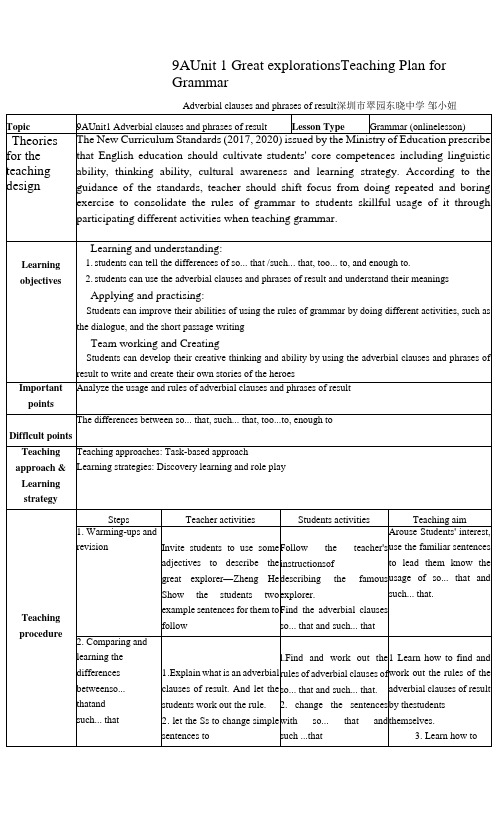
3.Ask students to do some exercise
1.Find the rules by comparing (he (wo sentences.
2.Finish (he exercise
Studentssay
something about their favourite heroes by using (he phrases so...that , such... that , too...to , and enough to
Use different activities to arouse the students' interest and also develop theirபைடு நூலகம்language using skills.
Team working and Creating
Students can develop their creative thinking and ability by using the adverbial clauses and phrases of result to write and create their own stories of the heroes
Learning objectives
Learning and understanding:
1.students can tell the differences of so... that /such... that, too... to, and enough to.
2.students can use the adverbial clauses and phrases of result and understand their meanings
沪教牛津版牛津深圳版九下英语Unit1 Great explorations Reading同步练习及解析(含中考链接)
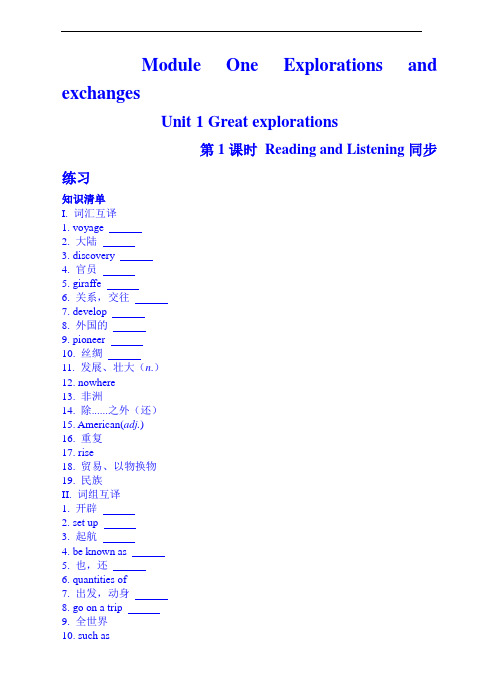
Module One Explorations and exchangesUnit 1 Great explorations第1课时Reading and Listening同步练习知识清单I. 词汇互译1. voyage2. 大陆3. discovery4. 官员5. giraffe6. 关系,交往7. develop8. 外国的9. pioneer10. 丝绸11. 发展、壮大(n.)_________12. nowhere ____________13. 非洲____________14. 除......之外(还) __________15. American(adj.)_________16. 重复____________17. rise _____________18. 贸易、以物换物___________19. 民族______________II. 词组互译1. 开辟2. set up3. 起航4. be known as5. 也,还6. quantities of ________7. 出发,动身8. go on a trip9. 全世界___________10. such as ____________III.根据汉语完成句子,每空一词。
1.我太累了以至于不能往前走了。
I was tired I could not walk on.2.队长命令我们马上离开这儿。
The captain ushere at once.3.我的任务是打扫客厅。
My task the living room.4.这个男孩足够强壮,能够搬得动那个大箱子。
The boy is to carry that big box.5.安娜年龄太小,不能去上学。
Anna is young go to school.6. 它们足够大,能携带25000人以及大量的货物。
They were _______ _________ _________ carry 25,000 people as well asvery large quantities of goods.7. 在每次航行结束,郑和带回了许多在中国第一次见到的东西,比如一只非洲长颈鹿。
广东省深圳市上海牛津沪教9年级下 九年级 下 Unit 1同步知识点详解和练习 (第1课时)
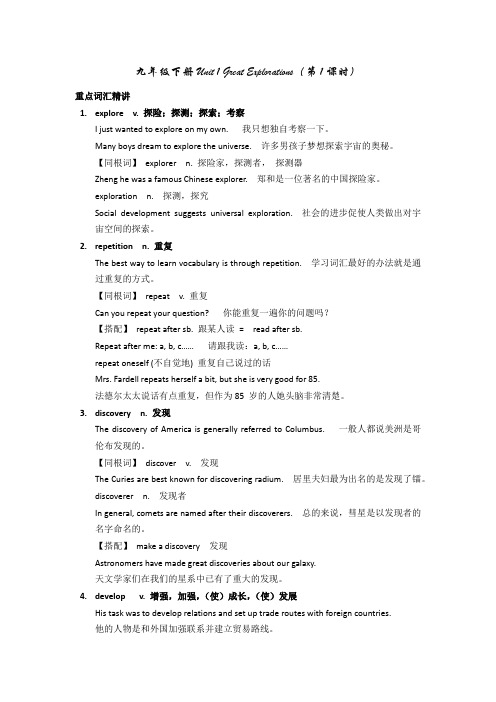
九年级下册Unit 1 Great Explorations(第1课时)重点词汇精讲1.explore v. 探险;探测;探索;考察I just wanted to explore on my own. 我只想独自考察一下。
Many boys dream to explore the universe. 许多男孩子梦想探索宇宙的奥秘。
【同根词】explorer n. 探险家,探测者,探测器Zheng he was a famous Chinese explorer. 郑和是一位著名的中国探险家。
exploration n. 探测,探究Social development suggests universal exploration. 社会的进步促使人类做出对宇宙空间的探索。
2.repetition n. 重复The best way to learn vocabulary is through repetition. 学习词汇最好的办法就是通过重复的方式。
【同根词】repeat v. 重复Can you repeat your question? 你能重复一遍你的问题吗?【搭配】repeat after sb. 跟某人读= read after sb.Repeat after me: a, b, c…… 请跟我读:a, b, c……repeat oneself (不自觉地) 重复自己说过的话Mrs. Fardell repeats herself a bit, but she is very good for 85.法德尔太太说话有点重复,但作为85 岁的人她头脑非常清楚。
3.discovery n. 发现The discovery of America is generally referred to Columbus. 一般人都说美洲是哥伦布发现的。
【同根词】discover v. 发现The Curies are best known for discovering radium. 居里夫妇最为出名的是发现了镭。
沪教牛津版九年级下册课文与翻译
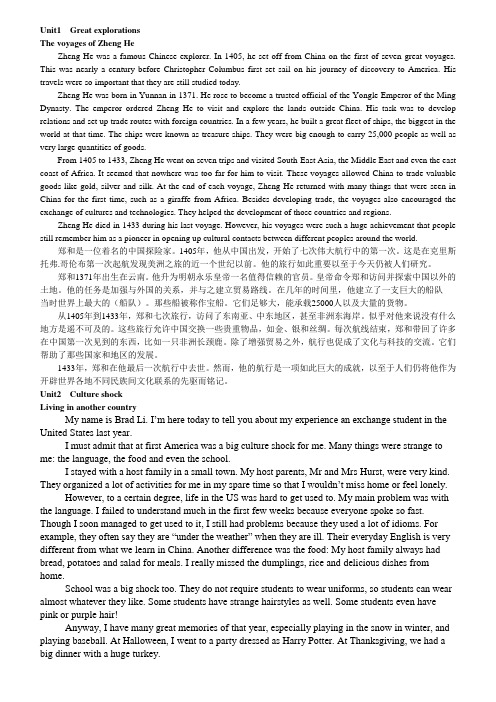
Unit1 Great explorationsThe voyages of Zheng HeZheng He was a famous Chinese explorer. In 1405, he set off from China on the first of seven great voyages. This was nearly a century before Christopher Columbus first set sail on his journey of discovery to America. His travels were so important that they are still studied today.Zheng He was born in Yunnan in 1371. He rose to become a trusted official of the Yongle Emperor of the Ming Dynasty. The emperor ordered Zheng He to visit and explore the lands outside China. His task was to develop relations and set up trade routes with foreign countries. In a few years, he built a great fleet of ships, the biggest in the world at that time. The ships were known as treasure ships. They were big enough to carry 25,000 people as well as very large quantities of goods.From 1405 to 1433, Zheng He went on seven trips and visited South-East Asia, the Middle East and even the east coast of Africa. It seemed that nowhere was too far for him to visit. These voyages allowed China to trade valuable goods like gold, silver and silk. At the end of each voyage, Zheng He returned with many things that were seen in China for the first time, such as a giraffe from Africa. Besides developing trade, the voyages also encouraged the exchange of cultures and technologies. They helped the development of those countries and regions.Zheng He died in 1433 during his last voyage. However, his voyages were such a huge achievement that people still remember him as a pioneer in opening up cultural contacts between different peoples around the world.郑和是一位着名的中国探险家。
沪教牛津版九年级下册英语教材
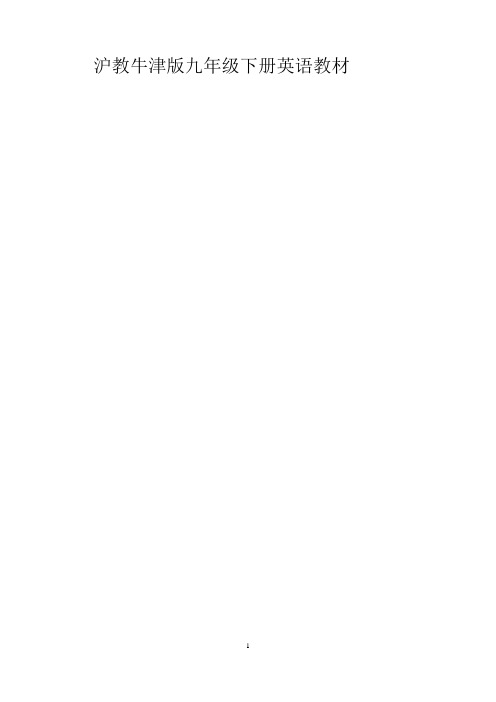
沪教牛津版九年级下册英语教材Unit1Great exploration ➢单词➢重点短语open up 开辟Hand in 上交go on a trip 去旅行look for 寻找set up 建立;设立Around the world 世界各地set sail 起航such as 例如(be) known as 被称为At the end of 在......末端as well as 也;还Not ...until 直到......才......lead to 导致Because of 因为,由于compare…with…把……与……对比between ...and...在......和......之间➢重点句型1. They were big enough to carry 25,000 people as well as very large quantities of goods.它们足够大,能携带25000 人以及大量的货物。
2. At the end of each voyage, Zheng He returned with many things that were seen in China for the first time, such as a giraffe from Africa.在每次航行结束,郑和带回了许多在中国第一次见到的东西,比如一只非洲长颈鹿。
3. It has become one of the biggest companies in the country.它已经成为了这个国家最大的公司之一。
➢课文翻译Unit1 Reading (书本P3)The voyages of Zheng He郑和下西洋Zheng He was a famous Chinese explorer. In 1405, he set off from China on the first of seven great voyages.郑和是中国著名的探险家。
(word完整版)最新沪教牛津版九年级下册课文与翻译
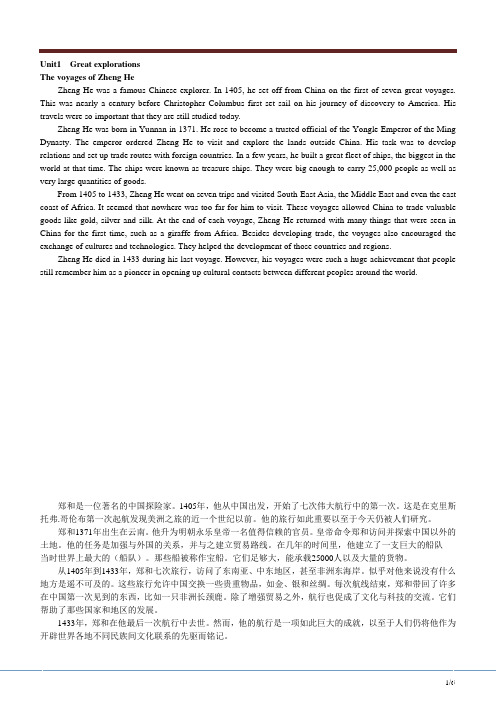
Unit1 Great explorationsThe voyages of Zheng HeZheng He was a famous Chinese explorer. In 1405, he set off from China on the first of seven great voyages. This was nearly a century before Christopher Columbus first set sail on his journey of discovery to America. His travels were so important that they are still studied today.Zheng He was born in Yunnan in 1371. He rose to become a trusted official of the Yongle Emperor of the Ming Dynasty. The emperor ordered Zheng He to visit and explore the lands outside China. His task was to develop relations and set up trade routes with foreign countries. In a few years, he built a great fleet of ships, the biggest in the world at that time. The ships were known as treasure ships. They were big enough to carry 25,000 people as well as very large quantities of goods.From 1405 to 1433, Zheng He went on seven trips and visited South-East Asia, the Middle East and even the east coast of Africa. It seemed that nowhere was too far for him to visit. These voyages allowed China to trade valuable goods like gold, silver and silk. At the end of each voyage, Zheng He returned with many things that were seen in China for the first time, such as a giraffe from Africa. Besides developing trade, the voyages also encouraged the exchange of cultures and technologies. They helped the development of those countries and regions.Zheng He died in 1433 during his last voyage. However, his voyages were such a huge achievement that people still remember him as a pioneer in opening up cultural contacts between different peoples around the world.郑和是一位著名的中国探险家。
沪教牛津版牛津深圳版九年级英语下Unit 1 Great explorations教案
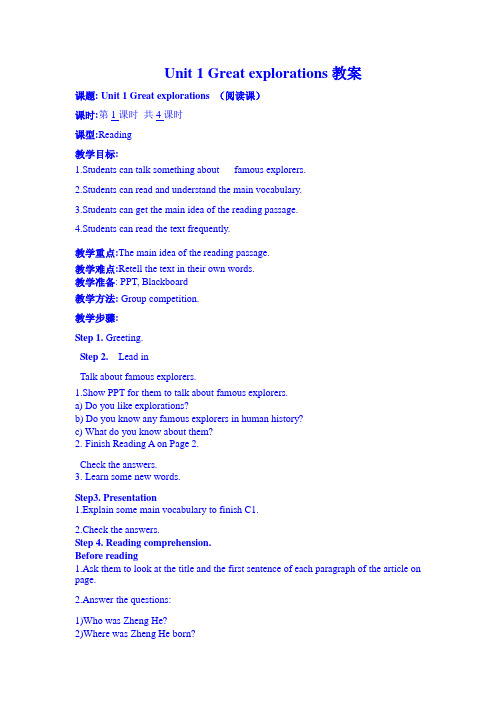
Unit 1 Great explorations教案课题: Unit 1 Great explorations (阅读课)课时:第1课时共4课时课型:Reading教学目标:1.Students can talk something about famous explorers.2.Students can read and understand the main vocabulary.3.Students can get the main idea of the reading passage.4.Students can read the text frequently.教学重点:The main idea of the reading passage.教学难点:Retell the text in their own words.教学准备: PPT, Blackboard教学方法: Group competition.教学步骤:Step 1. Greeting.Step 2. Lead inTalk about famous explorers.1.Show PPT for them to talk about famous explorers.a) Do you like explorations?b) Do you know any famous explorers in human history?c) What do you know about them?2.Finish Reading A on Page 2.Check the answers.3.Learn some new words.Step3. Presentation1.Explain some main vocabulary to finish C1.2.Check the answers.Step 4.Reading comprehension.Before reading1.Ask them to look at the title and the first sentence of each paragraph of the article on page.2.Answer the questions:1)Who was Zheng He?2)Where was Zheng He born?3)When did Zheng He go on his trips?4)What effects did his trips have on China and the world?3.Finish Reading B on Page 2 and check the answers.While reading1.Ask the students to read the text to match the events with the numbers.2.Read Para. 1 and fill in the blanks.3.Read Para. 2&3 and complete the chart.4.Read Para. 4 and complete the chart.5. Read and match each paragraph with its main idea.6.Read the passage. Never give up and finish the exercises D1 and D2 on Page 5. Step 5.Group work.1.In groups, discuss the following questions.1)Why is Zheng He called a “pioneer”?2)Why were Zheng He’s voyages so important in history?Ask them to give their possible answers.Step 6. Reading competition.1.Read after the tape.2. Practice the reading and compete to read best.anize a reading competitionStep 7. Sum upStep 8. HomeworkRead the text fluentlyStep 9.The blackboard designUnit 1. Great explorationsrepetition n.重复—repeat v.重复discovery n.发现—discover v.发现American adj.美洲的;美国的—America n.美洲;美国development n. 发展,壮大—develop v.增强,加强foreign adj.外国的———foreigner n.外国人课题: Unit 1 Great explorations (知识点及语法运用课)课时:第2课时共4课时课型: Points and grammars教学目标:1. Students can understand and remember the main points.2. Students can use adverbial causes of result,“too…to…” and“enough to”.教学重点:Language Points教学难点:Adverbial cause s of result,“too…to…” and“enough to”.教学准备: PPT, Blackboard教学方法: Group competition.教学步骤:Step 1. Revision.1.Review the main vocabulary.2.Retell the text in own words.Step 2. Group work1.Ask the students to collect the language points as much as possible in the text.2.Which group collect the most?Step 3. Language points learning.1.Explain main language points.2.Help the students make sentences with them to understand them better.3.Practice the language points to finish C2 on Page4.4.Check their answers.Step4. Grammar learning.Grammar A Adverbial causes of result1.Show PPT for them to understand what Adverbial causes of result is.2.Encourage them to make sentences to help them understand.3.Find the adverbial clauses in the text.4.Finish the given exercises on Page 7.Grammar B and C “too…to…”and“enough to”1.Show PPT for them to understand “too…to…”and“enough to”.2.Encourage them to make sentences to help them understand.3.Find the sentences about “too…to…”and“enough to”.in the text.4.Finish the given exercises on Page 8.Step 5. Practice the grammars.anize them to finish the exercise about the grammars in limited time .2. check the answers.Step 6. Sum upShow a PPT to guide the students to give sum up of the class.Step 7. HomeworkFinish the exercise on Page 9.Step8. The blackboard designUnit 1. Great explorationsIt semed/semms +that 从句似乎;好像…be know as 被称为so+ 形容词/副词+that 从句such + a(an)+形容词+单数可数名词+ that从句too +形容词/副词+ (for sb.) to do sth形容词/副词+ enough + to do sth课题: Unit 1 Great explorations (拓展阅读课)课时:第3课时共4课时课型: Reading教学目标:1. Students can tell the route of the Silk Road.2. Students can get the main idea about The Silk Road.教学重点:Tell the route of the Silk Road.教学难点: Get the main idea about The Silk Road.教学准备: PPT, Blackboard教学方法: Group competition.教学步骤:Step 1. Revision.1.Review the main language points.2.Review the grammars Adverbial causes of result,“too…to…” and“enough to”. Step 2. Lead in.1.Do you know the famous explorer Zhang Qian?2.What do you know about him?Step 3.Before reading1.Invite them to skim and scan the passage.2.Answer these two questions:1) .Who was Zhang Qian?2).Why did the emperor send Zhang Qian to explore and open routes to the outside world?While readingFollow the skills of skimming and scanning ,finish the exercises. Then check their answers.Step 4.More practice.1.Ask the students to read the passage about Marco Polo on Page 13.2.Answer the questions below it.3.Check the answers.Step 5. SummaryStep 6. Homework:Finish the exercises in this unit on your workbook.Step7. The blackboard designUnit1.Great explorationsThe Silk Road. 丝绸之路课题:Unit 1 Great explorations(写作课)课时: 第 4 课时,共 4 课时课型: Writing教学目标:1.The students can talk about famous explorers .2.Students can write some sentences on famous explorers .3.Students are in interested in explorations.教学重点: Students can talk about famous explorers.教学难点: Students can write out the sentences.教学准备: PPT, Blackboard教学步骤:Step 1.Revision1.Review how to ask for repetition.2.Practice the dialogue in pairs on Page 10.Step 2. Group work1. In groups, choose one of the famous explorers on page 2 and discuss this person.2.You can use the following questions.Who was this person?When and where did he live?What did he achieve and how?What do you think of this person?3.In groups, make a brief introduction of the explorer to the class.Step 3.Before writing.1.Talk about a famous explorer James Turner.2. Finish the given exercises on Page 11and check the answers.plete the chart B on Page 11 and check the answers.Step 4.Writing.1.Write an article about James Turner in three paragraphs.e James’s answers and the outline to help you.Step5.Show time1.Walk around to find the better work to show around.2.Correct the work and recommend the better one to learn from. Step 5. Sum up1.List the beautiful sentences they write in the passages2.Sum up some skills in writingStep 6.Culture corner.Read and talk about Ferdinand Magellan.Step7. HomeworkRewrite the article in the exercise book.Step8. The blackboard designUnit1.Great explorationsleave school 毕业compare …with… 把…与…对比。
沪教版(牛津)九年级英语下册Unit 1 Great explorations - Period 1 公开课PPT课件
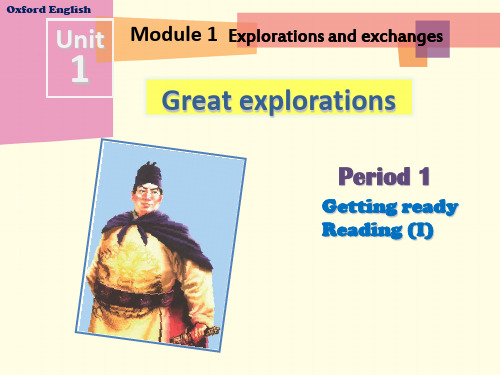
The people in the pictures below are all famous explorers. Match them with their achievements. Write the correct letters in the blanks.
Read and predict
Vocabulary
C1 The words in italics explain the meanings of some words on page 3. Find these words to complete the sentences. Change their forms if necessary.
Marco Polo
Marco Polo’s voyage in China
Zhang Qian
Zhang Qian’s
Christopher
opening up of Columbus
the ancient Silk Christopher
Road and
Columbus’s
touring in the discovery of
They are going on a trip. A small suitcase. A bag of lamps and torches. Hi told Lo to “travel light” and Lo thought this meant he should bring things that gave out light with him.
Look at the title and the first sentence of each paragraph of the article on page 3. Then answer the questions below.
沪教牛津版英语初三下册Unit-1-Great-exploration知识点总结及练习

沪教牛津版英语九下Unit 1 Great explorations知识点及练习必记单词voyage n.航行American adj.美洲的continent n.大陆discovery n.发现rise v.变得更加成功(或重要、强大等)develop v.增强,加强relation n.关系,交往trade n.贸易v.以物换物,互相交换foreign adj.外国的Africa n.非洲nowhere adv.无处,哪里都不silk n.丝织物,丝绸besides prep.除......之外(还)development n.发展,壮大pioneer n.先锋,先驱people n.民族,种族wealth n.财富spread v.传播短语归纳1.open up 开辟2.trade toutes 贸易路线3.set off 出发4.go on a trip 去旅行5.set up 建立,设立6.set sail 起航7.At that time 在那时8.(be) known as 被称为9.As well as 也,还10.too...to... 太......而不能......11.Grow up 长大12.pay attention to 注意13.Hand in 上交14.look for 寻找15.Around the world 世界各地16.such as 例如17.At the end of 在......末端18.quantities of 大量的19.Not ...until 直到......才...... 20.Because of 因为,由于pare...with... 把......与......对比22.between ...and...在......和......之间用法集萃1.how to do sth. 如何做某事2.order sb. to do sth. 命令某人做某事3.It seems that... 似乎......4.allow sb. to do sth. 允许某人做某事5.want to do sth. 想要做某事6.keep doing sth. 一直做某事7.one of the +形容词的最高级+可数名词复数,最......之一8.need to do sth. 需要做某事9.tell sb. to do sth. 告诉某人做某事10.would like to do sth, 想要做某事11.Why don’t we/you do sth.? 我们/你们为什么不做某事呢?12.形容词/副词+enough to do sth. 足够......能做某事经典句型1.They were big enough to carry 25,000 people as well as very large quantities of goods.它们足够大,能携带25000人以及大量的货物。
沪教牛津版初中英语九年级下册课件:Unit 1 Great explorations 3.88
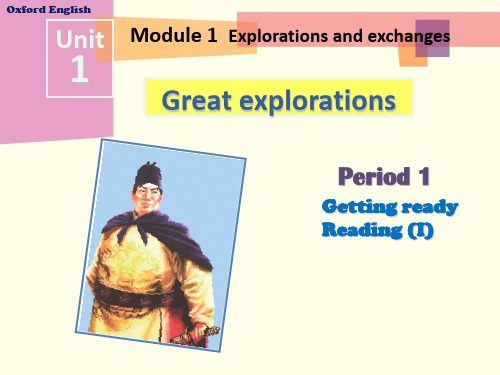
The people in the pictures below are all famous explorers. Match them with their achievements. Write the correct letters in the blanks.
Read and predict
Look at the title and the first sentence of each paragraph of the article on page 3. Then answer the questions below.
The voyages of Zheng He
Match
Read the article and match the words with their meanings.
Marco Polo
Marco Polo’s voyian’s
Christopher
opening up of Columbus
the ancient Silk Christopher
Road and
Columbus’s
touring in the discovery of
They are going on a trip. A small suitcase. A bag of lamps and torches. Hi told Lo to “travel light” and Lo thought this meant he should bring things that gave out light with him.
Vocabulary
C1 The words in italics explain the meanings of some words on page 3. Find these words to complete the sentences. Change their forms if necessary.
深圳沪教版初中英语九年级下课文+知识点
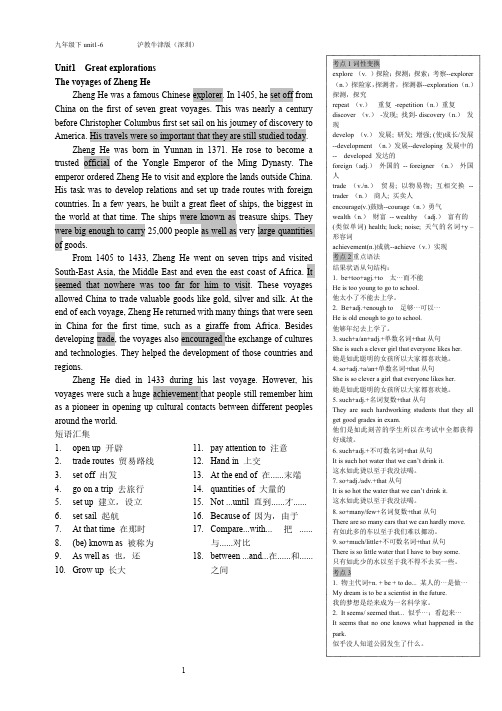
Unit1Great explorationsThe voyages of Zheng HeZheng He was a famous Chinese explorer.In1405,he set off from China on the first of seven great voyages.This was nearly a century before Christopher Columbus first set sail on his journey of discovery to America.His travels were so important that they are still studied today.Zheng He was born in Yunnan in1371.He rose to become a trusted official of the Yongle Emperor of the Ming Dynasty.The emperor ordered Zheng He to visit and explore the lands outside China. His task was to develop relations and set up trade routes with foreign countries.In a few years,he built a great fleet of ships,the biggest in the world at that time.The ships were known as treasure ships.They were big enough to carry25,000people as well as very large quantities of goods.From1405to1433,Zheng He went on seven trips and visited South-East Asia,the Middle East and even the east coast of Africa.It seemed that nowhere was too far for him to visit.These voyages allowed China to trade valuable goods like gold,silver and silk.At the end of each voyage,Zheng He returned with many things that were seen in China for the first time,such as a giraffe from Africa.Besides developing trade,the voyages also encouraged the exchange of cultures and technologies.They helped the development of those countries and regions.Zheng He died in1433during his last voyage.However,his voyages were such a huge achievement that people still remember him as a pioneer in opening up cultural contacts between different peoples around the world.短语汇集1.open up开辟2.trade routes贸易路线3.set off出发4.go on a trip去旅行5.set up建立,设立6.set sail起航7.At that time在那时8.(be)known as被称为9.As well as也,还10.Grow up长大11.pay attention to注意12.Hand in上交13.At the end of在......末端14.quantities of大量的15.Not...until直到......才......16.Because of因为,由于pare...with...把......与......对比18.between...and...在......和......之间考点1词性变换explore(v.)探险;探测;探索;考察--explorer(n.)探险家,探测者,探测器--exploration(n.)探测,探究repeat(v.)重复-repetition(n.)重复discover(v.)-发现;找到-discovery(n.)发现develop(v.)发展;研发;增强;(使)成长/发展--development(n.)发展--developing发展中的--developed发达的foreign(adj.)外国的--foreigner(n.)外国人trade(v./n.)贸易;以物易物;互相交换--trader(n.)商人;买卖人encourage(v.)鼓励--courage(n.)勇气wealth(n.)财富--wealthy(adj.)富有的(类似单词)health;luck;noise;天气的名词+y–形容词achievement(n.)成就--achieve(v.)实现考点2重点语法结果状语从句结构:1.be+too+agj.+to太···而不能He is too young to go to school.他太小了不能去上学。
沪教版 九年级下册英语单词表
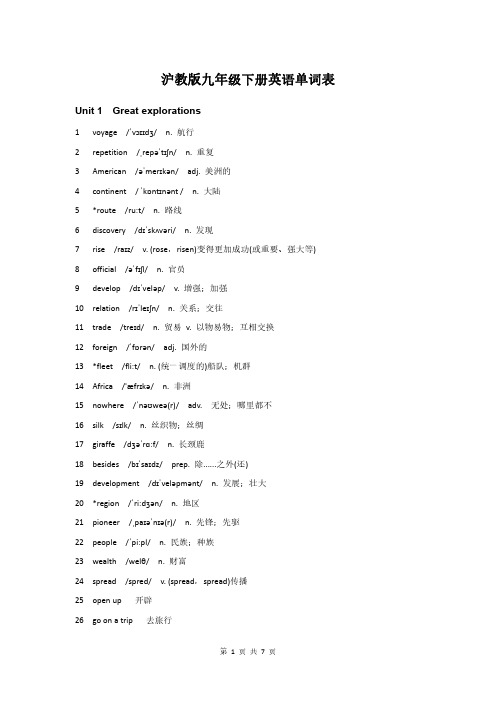
沪教版九年级下册英语单词表Unit1Great explorations1voyage/ˈvɔɪɪdʒ/n.航行2repetition/ˌrepəˈtɪʃn/n.重复3American/əˈmerɪkən/adj.美洲的4continent/ˈkɒntɪnənt/n.大陆5*route/ruːt/n.路线6discovery/dɪˈskʌvəri/n.发现7rise/raɪz/v.(rose,risen)变得更加成功(或重要、强大等)8official/əˈfɪʃl/n.官员9develop/dɪˈveləp/v.增强;加强10relation/rɪˈleɪʃn/n.关系;交往11trade/treɪd/n.贸易v.以物易物;互相交换12foreign/ˈfɒrən/adj.国外的13*fleet/fliːt/n.(统一调度的)船队;机群14Africa/'æfrɪkə/n.非洲15nowhere/ˈnəʊweə(r)/adv.无处;哪里都不16silk/sɪlk/n.丝织物;丝绸17giraffe/dʒəˈrɑːf/n.长颈鹿18besides/bɪˈsaɪdz/prep.除......之外(还)19development/dɪˈveləpmənt/n.发展;壮大20*region/ˈriːdʒən/n.地区21pioneer/ˌpaɪəˈnɪə(r)/n.先锋;先驱22people/ˈpiːpl/n.民族;种族23wealth/welθ/n.财富24spread/spred/v.(spread,spread)传播25open up开辟26go on a trip去旅行27set up建立;设立28set sail起航29(be)known as被称为30as well as也;还31lead to导致32compare...with...把......与......对比Unit2Culture shock1culture shock/ˈkʌltʃə(r)ʃɒk/n.文化冲击;文化休克2camp/kæmp/n.度假营3*firework/ˈfaɪəwɜːk/n.烟火,烟花4*turkey/ˈtɜːki/n.火鸡5international/ˌɪntəˈnæʃnəl/adj.国际的6admit/ədˈmɪt/v.(常指勉强)承认7spare/speə(r)/adj.空闲的;空余的8degree/dɪˈɡriː/n.程度9fail/feɪl/v.失败;未能(做到)10manage/ˈmænɪdʒ/v.完成(困难的事);勉力完成11idiom/ˈɪdiəm/n.习语;惯用语12everyday/ˈevrideɪ/adj.每天的;日常的13uniform/ˈjuːnɪfɔːm/n.校服14whatever/wɒtˈevə(r)/pron.任何事物;一切事物15pink/pɪŋk/adj.粉红色的16purple/ˈpɜːpl/adj.紫色的17anyway/ˈeniweɪ/adv.无论如何;反正18especially/ɪˈspeʃəli/adv.尤其;特别19baseball/ˈbeɪsbɔːl/n.棒球运动20education/ˌedʒuˈkeɪʃn/n.有教益的经历21state/steɪt/n.州22national/ˈnæʃnəl/adj.国家的;民族的;全国的23president/ˈprezɪdənt/n.总统24vacation/vəˈkeɪʃn/n.假期25schedule/ˈʃedjuːl/n.日程安排26set off使(炸弹等)爆炸27take off脱下28in one's spare time在某人的空闲时间里29to a certain degree在某种程度上30get used to习惯于;适应31under the weather略有不适;不得劲Unit3The environment1concern/kənˈsɜːn/n.担心;忧虑2atmosphere/ˈætməsfɪə(r)/n.大气层3temperature/ˈtemprətʃə(r)/n.温度;气温4*consumer/kənˈsjuːmə(r)/n.消费者5guess/ɡes/v.猜测6green/ɡriːn/adj.环境保护的;赞成环境保护的7lifeless/ˈlaɪfləs/adj.无生命的;无生物生长的8fuel/ˈfjuːəl/n.燃料9coal/kəʊl/n.煤10result/rɪˈzʌlt/n.结果11increase/ɪnˈkriːs/v.(使)增长;增多;增加12sea level/ˈsiːlevl/n.海平面13destroy/dɪˈstrɔɪ/v.摧毁;毁灭14nature/ˈneɪtʃə(r)/n.自然界;大自然15surface/ˈsɜːfɪs/n.表面;表层16soil/sɔɪl/n.土壤17flood/flʌd/n.洪水;水灾18habit/ˈhæbɪt/n.习惯19proper/ˈprɒpə(r)/adj.正确的;恰当的20friendly/ˈfrendli/adj.无害的21recycle/ˌriːˈsaɪkl/v.回收利用22purpose/ˈpɜːpəs/n.目的;用途23solution/səˈluːʃn/n.解决办法;处理手段24government/ˈɡʌvənmənt/n.政府25role model/rəʊlˈmɒdl/n.楷模;行为榜样26greenhouse effect温室效应27in danger在危险中28as a result of由于29result in造成;导致30mountains of许多;大量31take action采取行动32make a difference有作用;有影响33act as充当Unit4Natural disasters1*asteroid/ˈæstərɔɪd/n.小行星2*typhoon/taɪˈfuːn/n.台风3earthquake/ˈɜːθkweɪk/n.地震4*melt/melt/v.(使)熔化;(使)融化5flood/flʌd/v.(使)灌满水;淹没6badly/ˈbædli/adv.严重地;厉害地7alive/əˈlaɪv/adj.活着;在世8pool/puːl/n.水坑;水塘9object/ˈɒbdʒɪkt/n.物体;物品10coach/kəʊtʃ/n.长途汽车11pass/pɑːs/v.通过12line/laɪn/n.电话线路13dead/ded/adj.(因为缺电)不运行的;不转动的14boss/bɒs/n.老板15deaf/def/adj.聋的16stare/steə(r)/v.盯着看;凝视;注视17screen/skriːn/n.屏幕;荧光屏18notice/ˈnəʊtɪs/v.看(或听)到;注意到;意识到19awake/əˈweɪk/v.(awoke,awoken)(使)醒来20immediately/ɪˈmiːdɪətli/adv.立即;马上;即刻21missing/ˈmɪsɪŋ/adj.失踪的22fellow/ˈfeləʊ/adj.同类的;同伴的23natural disaster自然灾害24pass by通过;经过25stick with持续;坚持26sit around无所事事地消磨时间;闲坐27have no time to do不愿为......花时间;没有时间做...... 28fall on deaf ears不被理睬;不被注意29stare at盯着看;凝视;注视30in surprise惊讶地31for now暂时32survival kit救生包(装有食物、医疗用品和工具)Unit5Sport1announcement/əˈnaʊnsmənt/n.公告;通告2passport/ˈpɑːspɔːt/n.护照3the Pacific/ðəpəˈsɪfɪk/n.太平洋4Canada/ˈkænədə/n.加拿大5*resort/rɪˈzɔːt/n.旅游胜地;度假胜地6Canadian/kəˈneɪdiən/adj.加拿大的7*slope/sləʊp/n.斜坡;坡地8opposite/ˈɒpəzɪt/prep.与......相对;在......对面9glove/ɡlʌv/n.手套10couple/ˈkʌpl/n.夫妻;情侣11gentle/ˈdʒentl/adj.平缓的12honest/ˈɒnɪst/adj.坦率的;坦诚的13rope/rəʊp/n.绳索14rapid/ˈræpɪd/adj.迅速的;快速的15over/ˈəʊvə(r)/adv.结束16shame/ʃeɪm/n.令人惋惜的事;让人遗憾的事17fee/fiː/n.费用18enter/ˈentə(r)/v.报名参加19*semi-final/ˌsemiˈfaɪnl/n.半决赛20final/ˈfaɪnl/n.决赛21badminton/ˈbædmɪntən/n.羽毛球运动22stress/stres/n.精神压力;紧张23(be)dying to(do sth.)渴望(做某事);极想(做某事) 24check in(at)(在旅馆、机场等)登记;报到25can't wait to(do sth.)迫不及待想(做某事)26to be honest说实在的27fall over跌倒;摔倒;被......绊倒28keep one's balance保持平衡29build up建立Unit6Caring for your health1conduct/kənˈdʌkt/v.实施;执行2*lifestyle/ˈlaɪfstaɪl/n.生活方式3quarrel/ˈkwɒrəl/n.争吵4focus/ˈfəʊkəs/v.集中(注意力、精力等)于5*peer/pɪə(r)/n.同龄人;同辈6pressure/ˈpreʃə(r)/n.压力7whether/ˈweðə(r)/conj.是否8risk/rɪsk/n.风险9guard/ɡɑːd/v.守卫;保卫10*positive/ˈpɒzətɪv/adj.积极乐观的;自信的11cancel/ˈkænsl/v.取消;撤销;终止12bright/braɪt/adj.有希望的13force/fɔːs/v.强迫;迫使(某人做某事)14concert/ˈkɒnsət/n.音乐会;演奏会15private/ˈpraɪvət/adj.私人的16silent/ˈsaɪlənt/adj.不说话的;沉默的17musical instrument/ˈmjuːzɪklˈɪnstrəmənt/n.乐器18enemy/ˈenəmi/n.危害物,大敌19regular/ˈreɡjələ(r)/adj.有规律的;定时的20cheer/tʃɪə(r)/v.鼓励;鼓舞21low/ləʊ/adj.沮丧的;消沉的;无精打采的22eyesight/ˈaɪsaɪt/n.视力23dentist/ˈdentɪst/n.牙科医生24recovery/rɪˈkʌvəri/n.恢复;痊愈25deal with解决;处理;应付26guard against防止;提防27cancel out抵消;对消28look on the bright side(对不好的状态)持乐观的态度29take up(尤指为消遣)学着做;开始做30(be)busy with忙于做......31leave...behind把......抛在后面32cheer...up(使)变得更高兴;(使)振奋起来。
沪教版牛津英语【初三下册】Unit 1 Great explorations巩固练习
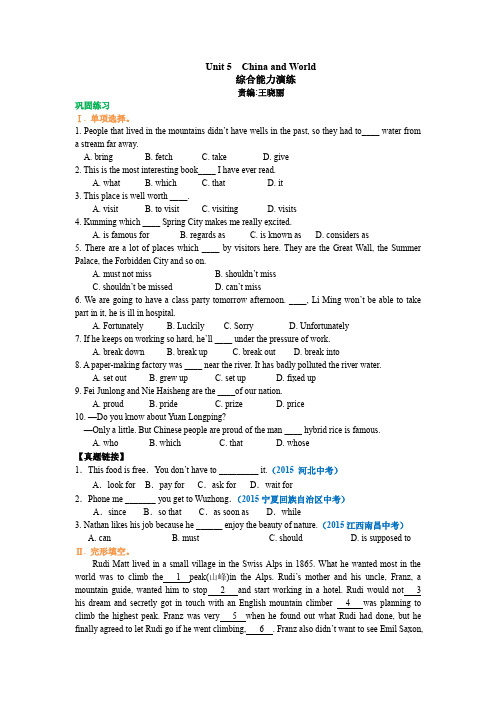
Unit 5 China and World综合能力演练责编:王晓丽巩固练习Ⅰ. 单项选择。
1. People that lived in the mountains didn’t have wells in the past, so they had to____ water froma stream far away.A. bringB. fetchC. takeD. give2. This is the most interesting book____ I have ever read.A. whatB. whichC. thatD. it3. This place is well worth ____.A. visitB. to visitC. visitingD. visits4. Kunming which ____ Spring City makes me really excited.A. is famous forB. regards asC. is known asD. considers as5. There are a lot of places which ____ by visitors here. They are the Great Wall, the Summer Palace, the Forbidden City and so on.A. must not missB. shouldn’t missC. shouldn’t be missedD. can’t miss6. We are going to have a class party tomorrow afternoon. ____, Li Ming won’t be able to take part in it, he is ill in hospital.A. FortunatelyB. LuckilyC. SorryD. Unfortunately7. If he keeps on working so hard, he’ll ____ under the pressure of work.A. break downB. break upC. break outD. break into8. A paper-making factory was ____ near the river. It has badly polluted the river water.A. set outB. grew upC. set upD. fixed up9. Fei Junlong and Nie Haisheng are the ____of our nation.A. proudB. prideC. prizeD. price10. —Do you know about Y uan Longping?—Only a little. But Chinese people are proud of the man ____ hybrid rice is famous.A. whoB. whichC. thatD. whose【真题链接】1.This food is free.You don’t have to _________ it.(2015 河北中考)A.look for B.pay for C.ask for D.wait for2.Phone me _______ you get to Wuzhong.(2015宁夏回族自治区中考)A.since B.so that C.as soon as D.while3. Nathan likes his job because he ______ enjoy the beauty of nature.(2015江西南昌中考)A. canB. mustC. shouldD. is supposed to Ⅱ. 完形填空。
- 1、下载文档前请自行甄别文档内容的完整性,平台不提供额外的编辑、内容补充、找答案等附加服务。
- 2、"仅部分预览"的文档,不可在线预览部分如存在完整性等问题,可反馈申请退款(可完整预览的文档不适用该条件!)。
- 3、如文档侵犯您的权益,请联系客服反馈,我们会尽快为您处理(人工客服工作时间:9:00-18:30)。
Unit 5 China and the World精讲精练词汇精讲1. introduce(1)introduce表示“介绍”时,主要用于介绍两个不认识的互相认识,或是向听众或观众宣布并介绍演讲者或广播、节目等的细节。
例如:Allow me to introduce my wife. 让我介绍一下,这是我太太。
It is my pleasure to introduce tonight’s speaker.我很荣幸来介绍今晚的演讲者。
(2)introduce习惯上不带双宾语,如果要表示把某人介绍给另一人,可用introduce…to…这样的结构。
汉语中的“作自我介绍”,英语用introduce oneself。
例如:Let me introduce my friend to you.(正)Let me introduce you my friend.(误)让我把我的朋友介绍给你。
Permit me to introduce myself. 请允许我介绍自己。
2. lie in(1)lie in表示“位于,坐落于……”,后常接大的地点。
根据后面地点不同,也可以用lie at…,lie on…。
例如:The city lies in the north of China. 那座城市位于中国的北部。
A temple lies on the top of the mountain. 一座寺庙位于山顶之上。
(2) lie作动词,还意为“平躺”,lie的现在分词形式是lying,过去式和过去分词分别为lay和lain。
例如:I found him lying on the ground. 我发现他躺在地上。
【拓展】(1)lie作动词时,也可意为“撒谎”,过去式和过去分词是规则的,均为lied。
lie也可用作名词,意为“谎言”。
例如:Don’t lie to me.不要向我撒谎。
(2)英语中,部分以-ie结尾的动词的-ing形式必须改ie为y再加-ing。
例如:die →dying tie →tying lie →lying3. remain(1)remain用作不及物动词,意为“剩下、留下、呆在”,相当于stay。
例如:When the others had gone, Joan remained to clean the room.别人走了,琼留下来清扫房间。
Only a few leaves remained on the tree. 树上只剩下几片叶子了。
The Smiths remained there all through the year. 史密斯一家人在那里呆了整整一年。
(2)remain作连系动词,意为“一直保持,仍然处于某种状态中”, 后可接多种成分作表语。
例如:Peter became a manager but John remained a worker.彼得当上了经理,但约翰仍然是一个工人。
Whatever great progress you have made, you should remain modest.无论你取得了多么大的进步,你都应一直保持谦虚。
4. not only…but also(1) not only...but (also)的意思是“不但……而且……”,连接两个并列成分,如果连接两个主语的时候,谓语动词和后面的主语保持一致。
例如:Not only my mother but (also) I like to go to the garden.不仅妈妈而且我也喜欢去公园。
He can play not only the piano but also the violin. 他不仅会弹钢琴,还会拉小提琴。
He was not only a writer but (also) an actor. 他不仅是一位作家,而且是一位演员。
(2) 以not only…but also 开头的句子往往引起倒装。
Not only did he complain about the food, but he refused to pay for it.他不仅抱怨饭不好吃,而且拒绝付饭钱。
5. expect(1) expect表示“期待,期望”,通常为及物动词,直接接宾语,还可接不定式的复合结构。
例如:We should not expect success overnight. 我们不能期望一夜之间就取得成功。
That’s just what we expected. 那正是我们所期望的。
He expected her to go with him. 他期望她同他一起去。
(2) expect还可表示“预计,预料”等,后接动词时要用不定式,不用动名词。
例如:I expect a storm. 我预计会有场暴风雨来。
I didn’t expect to fi nd you here. 我没料到在这里碰到你。
(3) expect后可接that 从句,若从句谓语为否定,注意否定的转移。
例如:I don’t expect that he has done such a thing. 我预料他不会干出这种事来。
I expect that I will be back on Sunday. 我预计星期日回来。
6.suppose(1)be supposed to do sth. 表示“(主动)被要求做某事,应该做某事,被期望做某事”。
意义上与should 接近,含有本该如何,但事实上并非如此的意思。
例如:You are supposed to finish it before dark. 你应该在天黑前完成这项工作。
(2)suppose作及物动词时,意为“假定,猜想”,后面常接宾语从句。
例如:Let’s suppose that the news is true. 让我们假定这个消息是真的。
(3)suppose和think, believe等后跟宾语从句时,主句主语是第一人称时,其反义疑问句与后面的宾语从句一致。
例如:I suppose she is serious, isn’t she? 我猜想她是认真的,不是吗?(4)对含有suppose的疑问句,在简略回答中,肯定回答用“Yes, I suppose so.”;否定回答用“No, I suppose not.”,或“No, I don’t suppose so.”。
例如:—Do you suppose he will come? 你猜他会来吗?—No, I suppose not / don’t suppose so.7. be famous forbe famous意为“著名的,出名的”,相当于be well-known。
(1) sb. be famous for…表示“某人以某种知识、技能或特征出名”。
Einstein was famous for his Theory of Relativity. 爱因斯坦因他的“相对论”而著名。
(2)sp. be famous for表示“因某种特产而出名”。
例如:The area is famous for its green tea. 这个地区因绿茶而出名。
【拓展】(1)sb. be famous as表示“某人作为某种身份出名”。
例如:Einstein was famous as a great scientist.爱因斯坦作为一位伟大的科学家而著名。
(2) sp. be famous as表示“作为某物的产地而出名。
The area is famous as a green tea producing place. 这个地区作为绿茶产地很出名。
8.chargebe charged with意为“承担……,被指控……,(因某事)谴责(人)”。
例如:Jack is charged with looking after his brother. Jack负责照看他的弟弟。
The man is charged with murder. 那人被指控杀人。
其主动语态为charge sb. with…,意为“指控某人”。
例如:The police charged the driver with careless driving. 警察指控这个驾驶员鲁莽驾驶。
【拓展】charge作动词,既可做及物动词,也可做不及物动词。
(1)作及物动词,意为“记账;给……充电;委以重任”等。
例如:Please charge these bills to my account. 请把这些帐单记在我的账上。
He forgot to charge the battery. 他忘记给电池充电了。
She was charged with an important mission. 她被委以重任。
(2)作不及物动词,意为“收费,要价;记账”等。
例如:How much do you charge for a room? 租一个房间要多少钱?Charge now,pay later. 现在先记账,以后再付款。
9. break outbreak out 表示“(战争、瘟疫、火灾等)爆发”。
例如:World War II broke out in September 1939.第二次世界大战爆发于1939年9月。
【拓展】(1) break up 表示“散会,(学期)结束”等。
例如:When does school break up? 本学期什么时候结束?(2)break down 可意为“(机器)坏了;(计划、谈判)失败;(谈话、通讯)中断等”。
例如:We are sorry to arrive late, because the car broke down.很抱歉我们来晚了,由于车坏了。
Negotiations between the two sides have broken down. 双方的谈判已经破裂。
(3)break into 表示“破门而入;打断(谈话)”。
例如:I caught two men trying to break into the office.我瞧见两个人想闯入我的办公室。
He broke into our talk rudely.他粗鲁地打断了我们的谈话。
10.such assuch as意为“例如”,用来罗列同类人或物中的几个例子,可置于被列举的事物与前面的名词之间,但such as后边不能用逗号。
例如:I have many hobbies, such as reading, dancing and singing.我有很多爱好,如读书,跳舞和唱歌。
